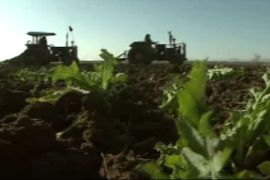Afghan poppy war alienates farmers
Officials hope opium producers whose crops are destroyed will not join the Taliban.

 |
| Abdul Hakim, a local farmer, watched as his poppy fields were destroyed |
Afghanistan’s campaign to eradicate the growing of poppies, which are then turned into opium or heroin, is suffering setbacks and protests, amid reports that the Taliban are growing in strength.
The programme, which involves ploughing up fields where the poppies are growing, is unpopular with those whose livelihoods are based around the poppy trade, and many local authorities are reluctant to carry out the operation.
Keep reading
list of 4 itemsAfter the Hurricane
World’s coral reefs face global bleaching crisis
Why is Germany maintaining economic ties with China?
Afghan troops have to guard the tractor drivers from attacks by the opium producers whose crops they are destroying.
In the Panjwai district of Afghanistan, Abdul Hakim, a farmer who was found to be growing poppies, watched as his fields and crops were destroyed.
Like many other farmers, he had borrowed money from local drug dealers and was supposed to pay them back with the poppies grown in his fields.
He said, after the destruction of the poppies, that he would persuade his relatives to join the Taliban.
Resurgent Taliban
There have been fears that the Taliban is growing in strength and support.
 |
| Khalid: Farmers still have time to grow wheat and other crops |
It was reported on Monday that Taliban fighters stormed Bakwa in the western province of Farah, the second district taken by the Taliban after they captured Musa Qala in southern Helmand province over two weeks ago.
Some analysts are concerned that the farmers who watch their fields ploughed up and their crops destroyed, will turn against the government and support the Taliban.
But Asadullah Khalid, the governor of Kandahar who personally oversees the eradication programme in the province, said he did not believe the farmers would join the Taliban.
“They will not go to join the Taliban,” he said. “They still have time to grow wheat and other crops.”
Poor security
Bad weather, a lack of funds and the poor security situation in the country have helped to delay the eradication programme. Instead of declining, production rose to a historic high last year.
Afghanistan supplies 80 per cent of the world’s opium.
According to a UN survey, Afghanistan produced a record 6,100 tonnes of opium in 2006, almost a third more than the world’s drug users consume.
Khalid told Al Jazeera: “Our president has said we should finish with these poppies. If we don’t finish with the poppies the poppies will finish Afghanistan … Poppies are an enemy of Afghanistan, like the Taliban.”